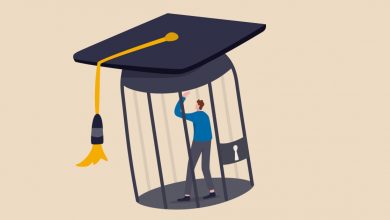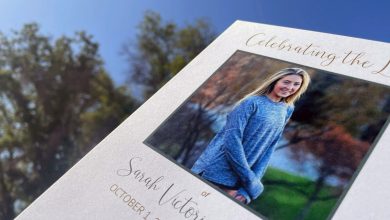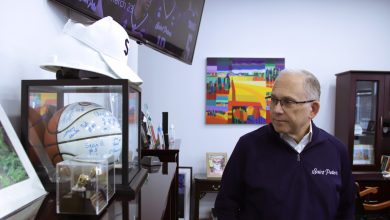Campuses Are Going Back to Normal. This Group Has One Message: Stop.

[ad_1]
When the University of Maryland at Baltimore’s law school resumed instruction online, along with many other American colleges, in the fall of 2020, Courtney A. Bergan had a momentous realization. It was the first time in their academic career that they had experienced meaningful inclusion.
Bergan, a law student who uses they/them pronouns, has a visual impairment and a service dog. But over Zoom, others can’t tell they are disabled. They noticed a shift in how people treated them in an online classroom.
“It made me realize how much bias I was experiencing based on people’s perceptions about my disability rather than about me,” Bergan said. “I don’t think there’s anything wrong with being disabled, and it’s a really important part of my identity. But it was really startling to me how much people treated me differently.”
A year later, in 2021, the college returned to in-person learning. When they asked for an accommodation, Bergan was told to watch class recordings with no option to participate. They said they had received pushback from some professors and attended classes in person during the fall-2021 semester. Then Bergan fell ill and once again asked to return to remote learning for the spring semester.
But the law school again denied Bergan’s request for remote participation in her classes, they said. They fell into a rabbit hole of administrative back-and-forth. When disability services couldn’t help, they met with the associate dean, then the dean of academic affairs, and on and on. Bergan said they ended up finishing the semester using those remote recordings sans participation. The Chronicle called and emailed the law school for comment, but did not receive a statement in time for publication.
“I definitely have spent far more time and energy advocating for myself and for access to education than I did on any of my classes in the past year,” Bergan said.
Bergan’s experience is not unique. Disabled students at colleges across the country are lamenting the loss of Covid-era hybrid learning and safety measures, like masking, that created a level of accessibility that some disabled students have been requesting for years. But over the past year, many colleges have been fighting to get “back to normal,” shelving mandatory masks and testing and virtual-learning options. A few colleges are even rolling back vaccination mandates.
Bergan is the lead organizer of a group, Covid Safe Campus, that is fighting for a return to full Covid protection policies. The organization, which is made up of disabled activists and academics, released a roundup of select campuses’ Covid policies for this fall on Thursday. The tracker covers the top-ranked 50 universities according to U.S. News & World Report as well as its top 25 public-health schools. Eiryn A. Griest Schwartzman, one of the group’s founders and its executive director, called the results “alarming.”
According to the tracker, only eight of the 50 top universities are mandating masks in the classroom or elsewhere on campus. The same number, eight out of 50, have testing requirements, although mostly only for the unvaccinated or unboosted. And less than half of the universities have active Covid dashboards, showing the current status of infections on campus.
Griest Schwartzman, who uses they/them pronouns, said they couldn’t reliably include in the tracker access to hybrid or virtual learning options, which are now often provided on a case-by-case basis on many campuses, although Covid Safe Campus continues to monitor it internally.
The lack of testing requirements means that even the active Covid dashboards are less helpful in determining the levels of transmission on campuses, Griest Schwartzman said, providing “a false sense of security.” However, they said, even a less-accurate dashboard is better than a defunct one.
Public-health schools have also largely abandoned stringent precautions, according to the tracker. Only six of the top 25 consistently require masking anywhere on campus.
“It really is symptomatic of the rest of the problems in schools in our country,” Griest Schwartzman said. “Leading public-health schools aren’t even taking one of the simplest, most proven precautions that are easy and effective.”
Building a Movement
Griest Schwartzman said they were unable to attend their own graduation from the University of Maryland-Baltimore County — held indoors in December 2021 during the Omicron surge — because its Covid protections were too lax, even after the university made some changes to increase safety like encouraging masks. In an emailed statement, a university spokeswoman, Dinah Winnick, wrote that the campus prioritizes “student access and safety,” and that for the December 2021 ceremony, the commencement team met with students to create individual safety plans and provided virtual options. Griest Schwartzman said the institution’s safety measures were still not enough for them to attend the mass indoor gathering, and they were not included in the virtual ceremony either.
The experience of going back and forth with the administration led them to help found Covid Safe Campus.
“Many of the people in our team are chronically ill, and that is one of our motives, to ensure that we’re all protected as high-risk people,” Griest Schwartzman said. “Clearly individual advocacy is not enough. We need a movement to build people power around us so that schools can’t just dismiss individual students.”
The group is calling for restoration of measures like campuswide mask mandates and required weekly testing. But only one university in the tracking data falls into that category: the California Institute of Technology, which still requires masking in all indoor spaces and requires twice-weekly surveillance testing.
“There is still time for universities to be leaders in creating policies or reinstating policies that promote equity inclusion through making students safer and through providing hybrid access,” Griest Schwartzman said.
But the push toward a return to normalcy is nearly universal nationwide, a move reflected in guidelines from the Centers for Disease Control and Prevention, which in August dropped social-distancing recommendations and further relaxed quarantine guidelines.
Griest Schwartzman called on individuals to help when administrators don’t. “While we do advocacy to try to get better universally, it’s really important for individual people and departments and classrooms — any group of people that you can possibly get — to commit to caring for each other through at least masking,” they said.
Some professors have taken their classroom masking rules a step beyond what colleges require, including specifying more-stringent policies in their syllabi. At the same time, some colleges have taken steps against professors or programs that mandate stronger Covid protections. For example, Northwestern University announced that programs and departments are forbidden to require arriving students to be tested.
Bergan also noted that, for many people with disabilities, a degree is the only way to find a job, especially one that can be done remotely.
“As a disabled student, I hear a lot about how disabled people don’t work or whatever. But a lot of us need higher-education degrees to have any meaningful access to employment,” Bergan said. “And so if people want us to have employment opportunities, then you have to give us opportunities for inclusive education.”
Bergan completed their spring semester using only recordings, which were on a timer and often cut off before the class really ended. They had to supplement their learning with YouTube videos, podcasts, and whatever else they could get their hands on, just to grasp the basic material, a situation that struck them as “absurd.”
“Can you tell me,” Bergan asked, “how that’s equitable?”
[ad_2]
Source link





